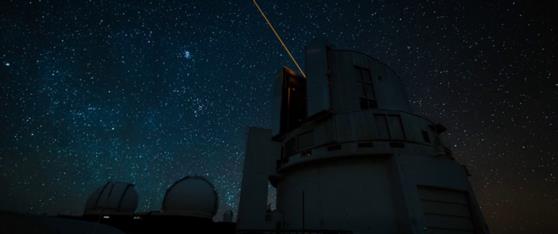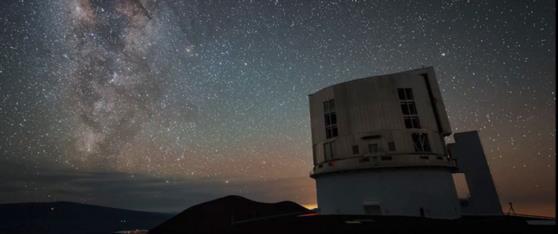
NavList:
A Community Devoted to the Preservation and Practice of Celestial Navigation and Other Methods of Traditional Wayfinding
From: Frank Reed
Date: 2022 Jan 13, 16:00 -0800
Below you'll find two screen captures from the recent broad satire of the end of the world "Don't Look Up". In the film astronomers working at a mountaintop observatory discover a big comet on a collision course with Earth, and in the context of our narcissistic, airheaded western society, let's just say that they have trouble getting the message across. And Silicon Valley's tech-based personality cult doesn't help.
The mountaintop observatory is identified by name, and there's a little misunderstanding that comes up whenever that telescope is mentioned: a tv host says "Gee, I didn't know [that Japanese car manufacturer] made telescopes, too!" So if you know this one, then you know the location. The film's production team did well and used imagery from the immediate vicinity of the correct telescope.
Here's the challenge: identify the location using whatever astronomical clues you have available. In the first image, we are clearly looking east. We can see the Pleiades with the Hyades below. Can you estimate your compass direction more accurately from the photo? Can you estimate your latitude from the photo (again, you may know already based on the telescope's name, but can you tell from astronomical details)? How many navigation stars can you spot in the photo? Specifically what is the star on the far left?
In the second image we're looking maybe southwest. What's that glow in the distance? And what navigation stars can you identify? Is the latitude consistent with the other photo? Is that, in fact, the same observatory structure? And finally, what is the date? We should be able to put a date on the photo, since there's a planet in view. I don't know which one, and I have no idea what the date is except that it's probably earlier than 2021 because of movie production schedules. Can we figure it out? And for that matter, is there any way to determine the date of the first photo astronomically?
Frank Reed
PS: My quickie movie review: it's a very broad satire that beats the concept to death, but it mostly works. I give it a B. I found it irritating on first pass and ended up watching it backwards (last 20 min, previous 20 min, etc.) but on the second pass it was actually good fun and an interesting entry in the "end of the world" genre. I've been compiling a comparison against 1950's George Pal thriller "When Worlds Collide" which, by contrast, is a melodrama. This movie, "Don't Look Up", is loaded with ridiculous big satire and small satire, too. There was a moment that made me laugh. A crowd has gathered on the beach in Florida to watch a Space Shuttle launch that may save the world. There's a deviation of some sort in the flight path a few minutes after launch, and we hear this exchange:
Person-A: "It looks like it's turning around!"
Person-B: "No, it's not. It's a course correction. It's pretty standard... --I was in the Navy."
That pseudo-expertise comment is the sort of thing we run into a lot in the world of celestial navigation. Someone solves a spherical triangle once and believes they're an instant expert on everything.








